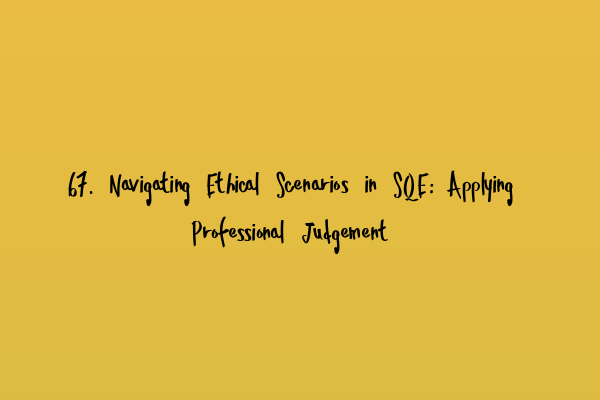Navigating Ethical Scenarios in SQE: Applying Professional Judgment
In the world of law, ethical dilemmas are bound to arise, and as aspiring solicitors, it is crucial to develop the skill of professional judgment. The Solicitors Qualifying Exam (SQE) is designed to assess candidates’ competency in handling such scenarios. In this blog post, we will delve into the significance of professional judgment in the SQE and provide valuable insights on how to navigate ethical scenarios effectively.
Before we proceed, if you haven’t already, make sure to check out the following related articles for valuable resources on mastering various aspects of the SQE:
– Mastering Time Management in SQE: Strategies for Efficient Exam Completion
– Conquer the Multiple Choice Questions (MCQ) in SQE1
– Mastering Effective Revision Techniques for SQE Success
– Scenario-Based Questions SQE2: Enhance Your Problem-Solving Skills
– Understanding SQE Feedback: Extracting Valuable Insights
Now, let’s dive into the world of ethical scenarios and professional judgment in the SQE.
Professional judgment in the SQE refers to the ability to make informed and ethical decisions in the context of legal scenarios. It encompasses both legal knowledge and ethical considerations, ensuring that solicitors uphold the highest standards of professionalism and integrity.
The SQE assesses candidates on their ability to identify and analyze ethical issues, evaluate options, and make appropriate decisions. It requires an understanding of the Solicitors Regulation Authority (SRA) Code of Conduct and the ability to apply it in real-life scenarios.
To effectively navigate ethical scenarios in the SQE, here are some key points to keep in mind:
1. Develop a strong foundation: Building a solid understanding of the SRA Code of Conduct is essential. Familiarize yourself with its principles, rules, and guidance to establish a strong ethical framework.
2. Analyze the scenario: When faced with an ethical scenario, take the time to analyze and understand the situation fully. Consider all relevant facts, identify stakeholders involved, and determine the potential legal and ethical implications.
3. Identify ethical issues: Look for any potential conflicts of interest, breaches of confidentiality, or violations of professional conduct. Pay attention to ethical obligations, such as acting in the best interest of the client and maintaining integrity throughout.
4. Evaluate options: Once you have identified the ethical issues, consider various options for resolution. Assess the pros and cons of each option and evaluate them based on ethical considerations, legal obligations, and potential consequences.
5. Apply the SRA Code of Conduct: It is crucial to apply the principles and rules outlined in the SRA Code of Conduct to the scenario at hand. Consider how the code relates to the specific situation and how it guides your decision-making process.
6. Justify your decision: When answering ethical scenario questions in the SQE, it is important to justify your chosen course of action. Explain the rationale behind your decision, referencing the relevant principles and rules from the SRA Code of Conduct.
7. Reflect on the outcome: After making your decision, reflect on the potential consequences and consider whether any further actions or precautions need to be taken. Reflecting on the outcome allows for continuous improvement and learning from experience.
In conclusion, the SQE is designed to assess candidates’ ability to navigate ethical scenarios by applying professional judgment. By developing a strong foundation in the SRA Code of Conduct, analyzing scenarios thoroughly, and evaluating options based on ethical considerations, aspiring solicitors can demonstrate their competency in ethical decision-making.
Remember to check out the related articles mentioned above for additional insights and strategies to excel in different aspects of the SQE. Good luck with your exam preparations, and may your professional judgment skills guide you to success in the SQE and beyond.
